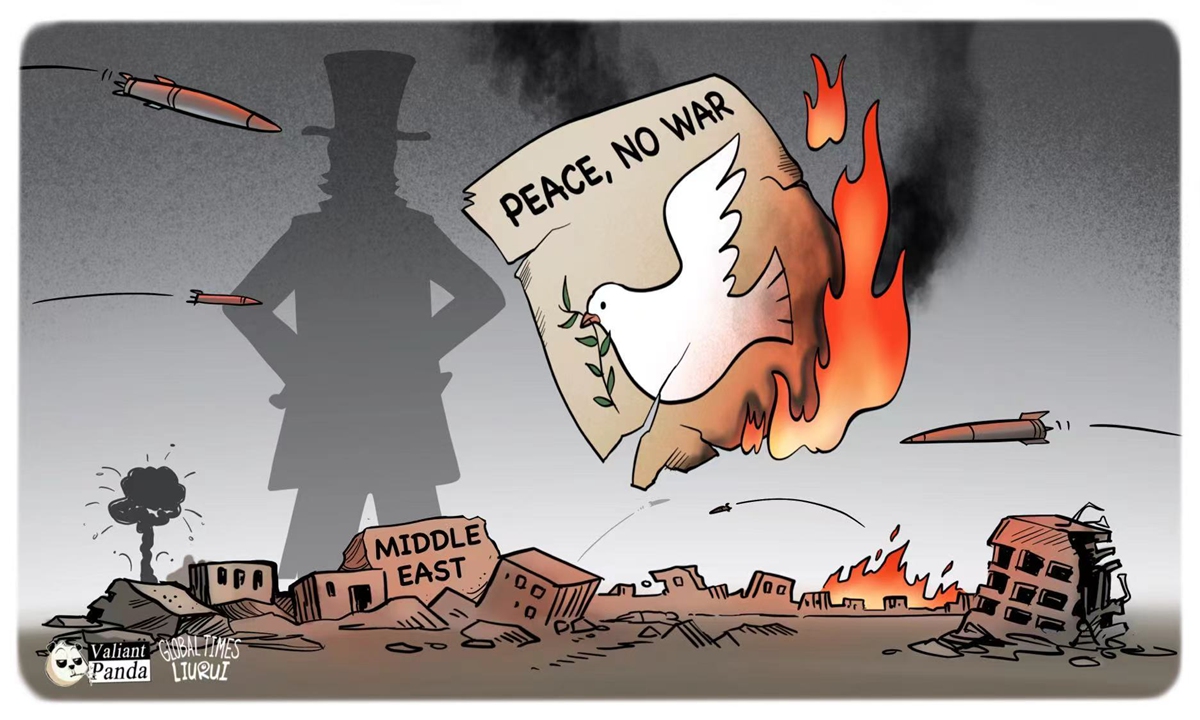
Destroying peace. Illustration: Liu Rui/GT
On Saturday local time, the US announced that it had launched airstrikes on three nuclear facilities in Iran. This marks the first time the US has officially intervened militarily in this round of the Iran-Israel conflict, drawing widespread shock from the international community. UN Secretary-General António Guterres said on social media that the move was "a dangerous escalation in a region already on the edge - and a direct threat to international peace and security." China's Foreign Ministry also strongly condemned the US attacks on Iran. US action, which seriously violates the purposes and principles of the UN Charter and international law, not only heightens tensions in the Middle East but also risks triggering a wider crisis.
Attacking nuclear facilities is extremely dangerous. Due to their unique nature, damage to such sites could lead to severe nuclear leaks, potentially resulting in humanitarian disasters and posing grave risks to regional safety. The tragic past lessons of the Chernobyl and Fukushima nuclear accidents already showed that the consequences of nuclear leaks don't pose a threat to a single country - they impact neighboring nations and the global security environment.
By using "bunker-buster" bombs to "accomplish what Israel could not," the US has deliberately escalated the level of weaponry used, pouring fuel on the flames of war and pushing the Iran-Israel conflict closer toward an uncontrollable state.
What the US bombs have impacted is the foundation of the international security order. By attacking nuclear facilities under the safeguards of the International Atomic Energy Agency (IAEA), Washington has set a dangerous precedent. This action, in essence, bypasses both the UN Security Council and the IAEA framework, attempting to unilaterally "resolve" the Iranian nuclear issue through force. This is a serious violation of the purposes and principles of the UN Charter and international law, as well as a rejection of the principled position of the international community, including China and the European Union, which has dealt with the Iranian nuclear issue through multilateral negotiations for many years. Washington's boast of close cooperation with Israel "as a team" confirms its nature of dragging its ally against international morality and multilateralism.
For Iran, the strike is a blatant provocation. After responding that it "reserves all options to defend its sovereignty, interests and people," Tehran on Sunday launched the powerful Kheibar Shekan missile targeting Israel for the first time. According to media reports, Ismail Kowsari, a member of the National Security Commission of the Parliament in Iran, said the country's parliament voted to approve the closure of the Strait of Hormuz. Iran's Supreme National Security Council is expected to weigh in and make a final decision on the matter. Iran is located in the choke point of the Strait of Hormuz, which around one-fifth of the world's total oil and gas consumption transits through. Once this channel is blocked by the war, international oil prices are bound to fluctuate dramatically, while global shipping security and economic stability will face serious challenges.
The US military's "direct involvement" has further complicated and destabilized the Middle East situation, drawing more countries and innocent civilians into the conflict and forcing them to face a loss. Even the Associated Press called the airstrikes on Iran's nuclear facilities a "perilous decision," while The New York Times warned that US military action against Iran would "bring risks at every turn." What is also receiving a lot of attention is that due to US strike on Iran, Yemen's Houthis announced it would resume attacks on US ships in the Red Sea. The region is already entangled in a complex web of sectarian divisions, proxy wars and external interventions. The facts show that US involvement is causing the Iran-Israel conflict to spill over. Within just one day, international investors rushed to sell off risk assets, and discussions of a "sixth Middle East war" surged across media platforms, reflecting the global community's growing anxiety over the region's spiraling instability.
China has consistently opposed the threat and abuse of using force. It advocates resolving crises through political and diplomatic means. In a recent phone call with Russian President Vladimir Putin, Chinese President Xi Jinping put forward a "four-point proposal" regarding the Middle East situation: promoting a cease-fire and ending the hostilities is an urgent priority; ensuring the safety of civilians is of paramount importance; opening dialogue and negotiation is the fundamental way forward; and efforts by the international community to promote peace are indispensable. This proposal reflects China's long-standing and farsighted security vision. History in the Middle East has repeatedly shown that external military intervention never brings peace - it only deepens regional hatred and trauma. The false logic behind US coercion by force runs counter to peace. Hopefully, the parties involved, especially Israel, will implement an immediate cease-fire, ensure the safety of civilians and open dialogue and negotiation to restore peace and stability in the region.













